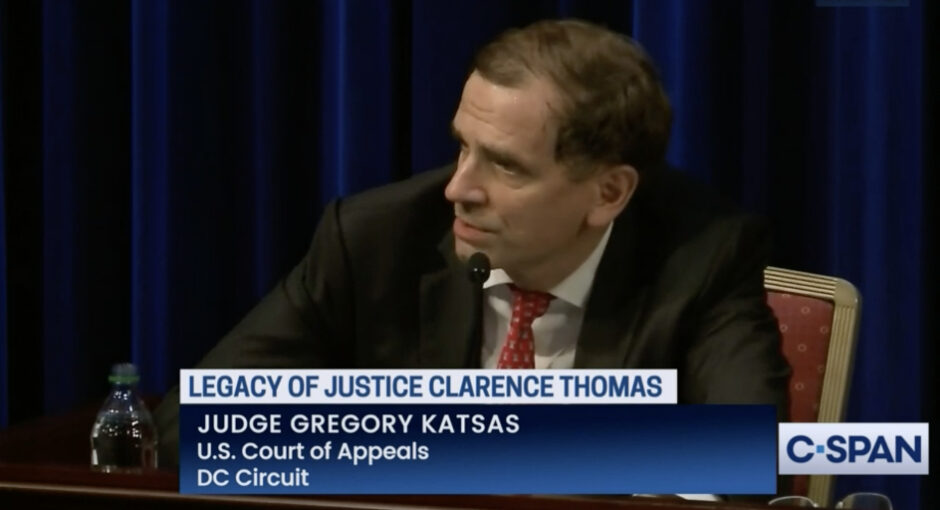Two of three judges on a federal appeals court panel yesterday repeatedly asked lawyers during a highly anticipated hearing in Washington, D.C., what standard the court should use to decide whether drug manufacturers’ 340B contract pharmacy conditions are legal.
The judges indicated they would vote to uphold a lower court’s November 2021 decision rejecting the federal government’s stance that the 340B statute bars all such conditions. If they do, it would be a setback for the federal government and 340B covered entities and a victory for pharmaceutical manufacturers.
An appeals court in Chicago will hear arguments in a companion case next week Monday. An appeals court in Philadelphia with hear arguments in three such cases on Nov. 15.
“The logic of your position is no conditions,” Judge Gregory Katsas of the U.S. Court of Appeals for the District of Columbia Circuit told U.S. Justice Department attorney Daniel Aguilar during Monday’s arguments in drug makers Novartis and United Therapeutics lawsuits against the U.S. Health and Human Services Department and Health Resources and Services Administration.
“That seems awfully hard to accept,” Katsas said.
“What is the test that this court should apply?” Judge Neomi Rao asked UT’s lawyer Philip Perry. “If there are some conditions pharmaceutical companies may impose, how do we determine which conditions are permissible?”
The panel’s third judge, J. Michelle Childs, said little during the hearing. Her questions focused on District Judge Dabney Friedrich’s choice not to rule on whether Novartis and UT’s specific conditions on offers of 340B pricing were legal, nor to issue injunctive relief “at this time,” in Friedrich’s words. Childs wanted to know if the case was ripe for appellate review.
“The district court believes it still has the case,” Childs asked Aguilar. “What is it that you’re expecting us to accomplish here?” Childs was appointed to the appeals court position by President Biden earlier this year and was one of Biden’s three finalists for U.S. Supreme Court justice. President Biden chose another judge from the U.S. Court of Appeals for the D.C. circuit, Kentanji Brown Jackson.
Katsas and Rao, who were both appointed to the court by former President Trump, mainly wanted the lawyers’ opinions on what would happen if the court were to hold that the standard for judging the legality of manufacturer conditions on 340B sales is whether, in placing such conditions, the manufacturer makes a bona fide offer of 340B pricing on its drugs.
Katsas told Aguilar, “Suppose I disagree with you that the statute prohibits imposing any conditions. What guidance would you give us on drawing a line,” he asked, beyond which a manufacturer’s condition ceases to be a bona fide offer of 340B pricing or otherwise frustrates the 340B statute’s purpose?
“Honestly, I’m not certain how that line would be administered,” Aguilar answered. “I’m not sure what that looks like.”
“Which is why this is a tough case,” Katsas said.
“We think the best reading of the statute is ours,” Aguilar said. Congress, he noted, has not authorized HRSA to issue a legislative rule on the issue. “If Congress wants to amend the statute, it obviously can.”
“You’ve given us a no-conditions position,” Katsas said later. “You haven’t given us a fallback [so] that if we’re talking about [a standard of] bona fide offers or frustration of purpose, if we’re doing some kind of balancing, here’s why some of these [conditions] fall on one side of the line rather than the other.”
If the court were to make such a ruling, Aguilar said, “you’re going to have litigation for each and every” manufacturer’s 340B pricing conditions. “I don’t know how that’s going to be workable. And it’s getting far afield” from the enforcement scheme Congress created giving HHS sole 340B enforcement authority. Aguilar referenced the 2011 U.S. Supreme Court unanimous decision that determined that 340B providers cannot sue drug manufacturers over allegations of overcharges. He pointed out that the justices determined that the government should be the arbiter for enforcing disputes in the program.
Later in the hearing, Aguilar took issue with UT lawyer Perry’s statement that the manufacturer’s 340B claims submission requirements take covered entities “five minutes every two weeks or an hour per year to provide.” Novartis’s lawyer also told the court that their company’s restrictions were not burdensome.
“There are 700 different drug manufacturers,” Aguilar said. “If each one had a claims data requirement, [covered entities] would have to comply with that.” If each manufacturer restricted shipments to hospitals’ contract pharmacies to those within a 40-mile radius of a hospital, as Novartis does, “they would have to comply with that,” he said. If each manufacturer restricted shipments to just one contract pharmacy per entity for those lacking an in-house pharmacy, “they’d have to comply with that.”
Rao seemed sympahetic with the drug manufacturer lawyers’s description of 340B as a program that has strayed from its original purpose. She described it as a massive transfer of money from the pharmaceutical companies to the pharmacies and covered entities. “Surely the government doesn’t think that was the purpose of the 340B program?” she asked Aguilar.
Agulilar said the purpose was to provide discounted drugs to covered entities and that the fees paid to pharmacies and third party administrators were relatively minor. He said that a majority of covered entities pass on savings directly to patients. He pointed out that contract pharmacies are particularly important for the patients of 340B providers since many of them are poor or located in rural areas and cannot easily take time off to pick up their medications during typical 9-5 hours.
The D.C. Circuit Court is expected to issue its opinion late this year or early next year.


